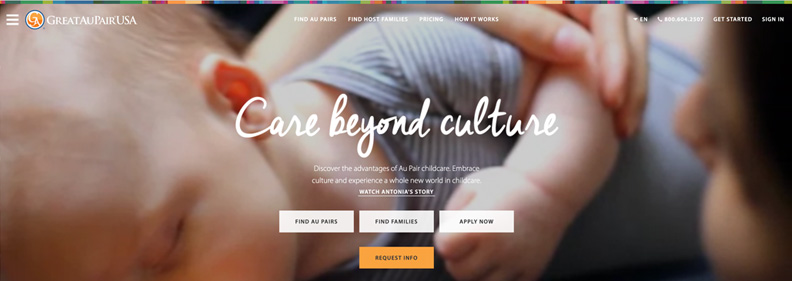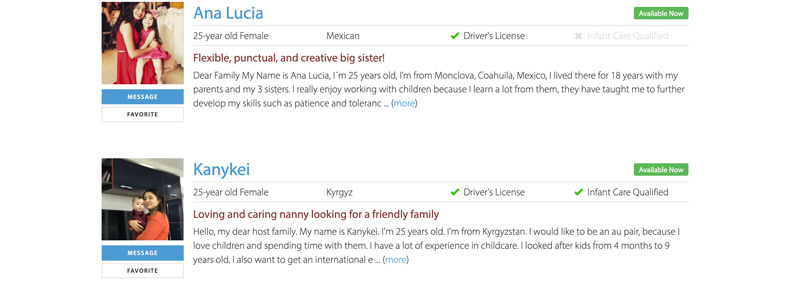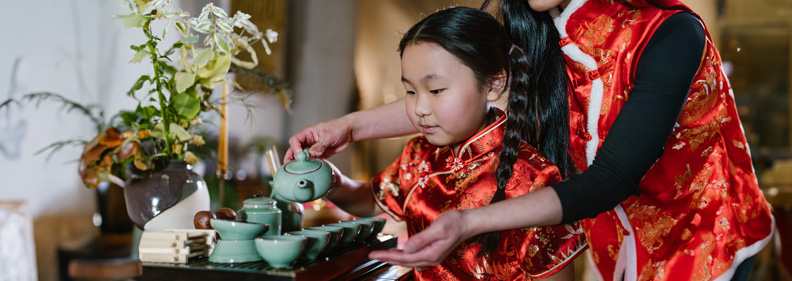Top 10 Au Pair Success Tips For Families
Finding the perfect au pair and establishing a successful relationship requires careful consideration and proactive communication. Here are the top 10 tips for families to increase the chances of finding the right au pair and ensuring a successful and lasting match: 1. Clearly Define Your Needs: Before starting the search process, identify your family's specific needs, expectations, your kids' interests, and preferences for an au pair. Consider factors such as desired skills, language proficiency, cultural compatibility, and responsibilities. 2. Choose a Reputable Au Pair Agency: Partnering with a reputable au pair agency such as GreatAuPair USA can provide access to a pool of pre-screened and qualified au pairs. Research different agencies, read reviews, and select one with a track record of successful placements.
3. Thoroughly Review Au Pair Profiles: Take the time to thoroughly review each au pair's profile, including their experience, qualifications, and personal preferences. Look for candidates who align with your family's values, interests, and requirements.
4. Conduct Comprehensive Interviews: Conduct in-depth interviews with potential au pairs to assess their suitability for your family. Ask a variety of questions related to their childcare experience, ability to adapt to new environments, communication skills, and any specific requirements you have. 5. Discuss Expectations and Responsibilities: Clearly communicate your expectations, house rules, and the specific responsibilities you expect the au pair to fulfill. Discuss working hours, childcare duties, household chores, and any additional tasks that may be required. Once you have decided on your caregiver, it’s important to remind them not to forget that every job is an act of responsibility, especially when it comes to caring for a child.
6. Cultural Exchange and Language Learning: Emphasize the cultural exchange aspect of the au pair experience. Discuss opportunities for language learning, exposure to your family's culture, and any cultural activities you would like to engage in together. 7. Provide Support and Guidance: Make your au pair feel welcome and supported upon their arrival. Offer assistance in navigating the local area, provide information about nearby amenities, and introduce them to the community. 8. Establish Open and Regular Communication: Foster a culture of open and regular communication with your au pair. Encourage them to share any concerns, questions, or suggestions they may have, and be proactive in addressing any issues that arise. 9. Respect and Appreciate Cultural Differences: Recognize and respect the cultural differences between your family and the au pair. Encourage open dialogue about customs, traditions, and practices to foster mutual understanding and appreciation. 10. Create a Positive Living Environment: Ensure that your au pair has a comfortable living environment within your home. Provide a private and well-equipped room, and access to shared amenities within the home, such as a kitchen, bathroom, laundry facilities, etc. Finally, give them opportunities to socialize with the family and feel like part of the community – invite them to join in on family activities and outings when possible. By following these top 10 pro tips, host parents can increase the likelihood of finding the perfect au pair match and establishing a successful and harmonious relationship throughout the duration of the au pair contract. Remember, clear communication, mutual respect, and ongoing support are key factors in ensuring a positive and fulfilling au pair experience for both the family and the au pair. 10 More Au Pair Success Tips for Host Families
Hiring an au pair can be a transformative experience for host families. It provides personalized childcare and an enriching cultural exchange. However, for the au pair program to be a success, there are essential strategies and tips host families should follow. In this guide, we'll explore the top 10 au pair success tips for families to ensure a harmonious and fulfilling partnership with your au pair. 1. Understand the Role of an Au PairThe Basics of an Au Pair. Before your au pair arrives, it's crucial to have a clear understanding of what an au pair is. Au pairs are young individuals from other countries who come to live with host families, providing childcare in exchange for room, board, and a weekly stipend. They aim to improve their language skills, immerse themselves in a new culture, and become temporary family members. 2. Establish Clear CommunicationOpen and Honest Communication. Effective communication is the foundation of a successful au pair experience. Ensure that both you and your au pair feel comfortable discussing expectations, concerns, and daily routines. Open, respectful, and honest communication is key to addressing challenges and building a strong relationship. 3. Set Realistic ExpectationsUnderstanding the Role. Host families should set realistic expectations about what their au pair can and cannot do. While au pairs provide invaluable childcare, they are not professional nannies. They offer individualized attention to your children and are often well-equipped to manage day-to-day responsibilities. 4. Plan Weekly SchedulesCreate a Structured Schedule. Having a well-structured weekly schedule is essential. Discuss the working hours and time off in advance. A clear schedule helps both you and your au pair to plan your time effectively, ensuring that duties, school, and free time are well-balanced. 5. Cultural Exchange: Embrace Differences
Celebrate Cultural Exchange. Cultural exchange is one of the most enriching aspects of the au pair program. Embrace the opportunity to learn about your au pair's home country, cultural differences, and language. Make your au pair feel comfortable discussing their own culture, while also sharing American culture with them. 6. Welcome Your Au Pair as a Family MemberTreat Them as Family. To create a successful au pair experience, treat your au pair as a family member. Involve them in family events, gatherings, and traditions. This inclusion fosters a sense of belonging and enriches the cultural exchange. 7. Meals and Language: Key ComponentsMeal Times and Language Learning. Use meal times as opportunities for cultural exchange and language learning. For example, you can prepare and enjoy a meal from your au pair's home country together. This not only makes meal times fun but also helps your au pair improve their English. 8. Host Family's Private Life: Respect BoundariesRespect Each Other's Privacy. While your au pair is a part of your family, it's important to respect the privacy of your host family's private life. Discuss boundaries, especially concerning your host parents' own private time and space. 9. Embrace the First Week: Make it MemorableFirst Week in Your Home. The first week in your home sets the tone for the rest of the au pair's stay. Make it a memorable and enjoyable experience. Plan activities to help your au pair feel comfortable and integrated into your family and daily routines. 10. Stay Positive and FlexibleStay Positive and Flexible. In any family, including your au pair in your life requires flexibility and a positive attitude. Be understanding on bad days, and remember that cultural differences and language barriers can occasionally pose challenges. Stay positive and focused on the long-term benefits of the cultural exchange. A World of PossibilitiesHiring an au pair opens up a world of possibilities for your family. It provides childcare with a personal touch, enriches your family's life with cultural exchange, and creates a sense of global connection. By following these top 10 au pair success tips for host parents, you can make the most of your au pair program, creating a harmonious, rewarding experience for both your children and your au pair. Remember that the key to success lies in open communication, realistic expectations, and a welcoming, positive attitude toward your au pair as they become a valued part of your family. Unlocking Success: The Art of Finding the Perfect Au Pair and Building a Strong Relationship
Finding the ideal au pair to join your family and establishing a thriving and harmonious relationship is an art, requiring careful consideration and proactive communication. It's not just about a host family hiring a childcare provider; for most au pairs, it's about being welcomed as a new member of your family. To achieve this, here are the key steps to follow: 1. Understanding the Au Pair ProgramBefore you begin your search for the perfect au pair, it's essential to have a solid understanding of the au pair program. The program allows young individuals from different cultures to live with host families, providing childcare assistance in exchange for cultural immersion. It's a two-way cultural exchange experience, and being aware of this dynamic is the first step towards a successful match. 2. Setting Clear Expectations
One of the most important aspects of finding the right au pair is setting clear expectations from the start. Discuss what you expect from the au pair in terms of childcare responsibilities, daily routines, and any additional tasks you may require. This clarity is key to a successful partnership. 3. Communication is KeyGood communication is the foundation of any successful relationship, and this applies to your relationship with your au pair as well. Effective and open communication helps prevent misunderstandings and builds trust. Regularly check in with your au pair, ask about their experiences, and share your thoughts and expectations. Encourage them to express themselves, and be sure to actively listen. 4. First Week MattersThe first week is crucial for setting the tone of your relationship. During this period, make an effort to welcome your au pair and help them acclimate to your family's routines. Show them around the house, introduce them to your children, and make them feel at home. A warm welcome can go a long way in building a strong foundation. 5. Establish a RoutineA well-structured daily routine helps create a sense of stability for both the au pair and your children. Set clear schedules for meals, playtime, educational activities, and bedtime. A consistent routine ensures that everyone knows what to expect, reducing stress and fostering a sense of security. 6. Meals and Food PreferencesDiscuss food preferences, dietary restrictions, and cultural cuisine with your au pair. Understanding their preferences can lead to a more enjoyable dining experience for everyone. Encourage sharing meals and recipes as part of the cultural exchange. 7. Free Time and FunAllow your au pair to have free time and encourage them to have fun and make friends. This is an essential aspect of their cultural immersion. Supporting their social interactions and hobbies outside of their childcare duties is a valuable part of the au pair experience. 8. A Good Morning and a Good NightStart and end each day with a warm greeting and farewell. A simple "good morning" and "good night" can set a positive tone and make your au pair feel appreciated. It's a small gesture that goes a long way in building a strong relationship. 9. Be FlexibleFlexibility is a two-way street. While it's important for your au pair to adapt to your family's routines, it's equally important for you to be flexible when needed. Emergencies, unexpected changes, and unforeseen situations can arise, and being understanding and adaptable can ease tensions. 10. The Importance of Culture
Remember that the au pair program is a cultural exchange. Embrace this aspect by sharing your family's culture with your au pair and encouraging them to share their own. Attend cultural events, explore new traditions, and make the exchange a valuable experience for both sides. Successful host parents will find the perfect au pair and build a strong, successful relationship au pairs through a blend of clear expectations, effective communication, and a genuine appreciation for cultural exchange. By treating au pairs as a valuable addition to your family, host parents can create a nurturing environment that benefits not only your children but also your au pairs. Enjoy this unique opportunity for cross-cultural learning that can provide enriching experiences for all involved. |
| Return to Help |
| Return to FAQs |









